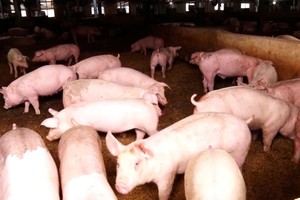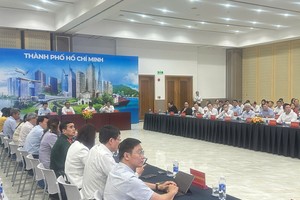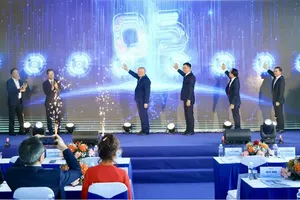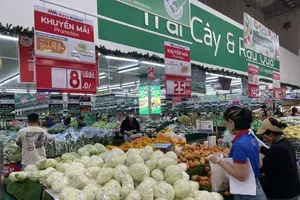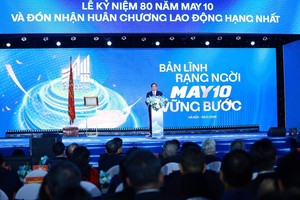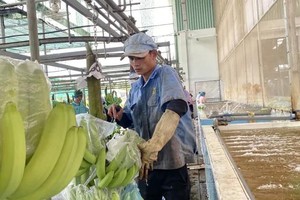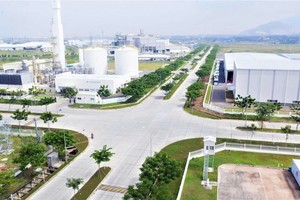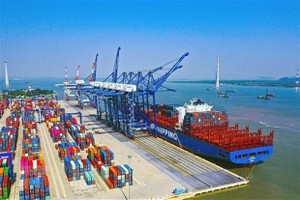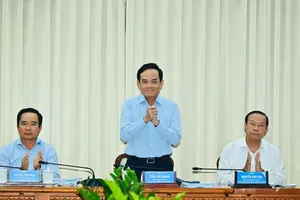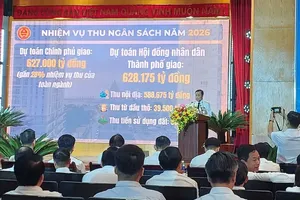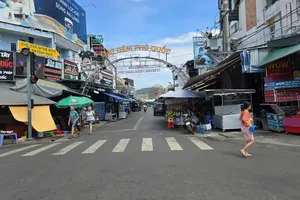A reporter from Sai Gon Giai Phong Newspaper spoke with Vice Chairman of the Ho Chi Minh City People’s Committee Nguyen Loc Ha, Head of the Forum’s Organization Board, regarding this significant event.
Transforming ideas into solutions
)
“We are at a pivotal moment in the nation’s development, as the global economy shifts toward a new competitive structure driven by knowledge, data, technology, and green standards. In this context, the 2025 Autumn Economic Forum, under the theme “Green Transformation in the Digital Era,” represents not only a strategic orientation but also a clear affirmation of the city’s new development vision. It emphasizes that rapid growth must go hand in hand with sustainability and that innovation should serve as a driving force embedded across all strategic initiatives,” Vice Chairman of the Ho Chi Minh City People’s Committee Nguyen Loc Ha said.
The forum will serve as a platform to transform thinking into action, turning ideas into practical solutions and effective application models. It aims to help Ho Chi Minh City, as the nation's economic locomotive, become a pioneering locality leading strategic shifts, accelerating Vietnam’s journey toward a green and digital development in the new era.
In the context of traditional growth drivers such as low-cost labor, cheap production, and older-generation foreign direct investment gradually reaching their ceilings, both the country and Ho Chi Minh City are compelled to transition toward a model anchored in the digital economy, high technology, innovation, and green growth.
The year 2025 marks a pivotal phase for Vietnam as it vigorously implements commitments to Net Zero, green trade, carbon taxation, and the goal of a digital economy accounting for over 20 percent of GDP. This demands that Ho Chi Minh City create a “dialogue space of sufficient scale” to connect global knowledge and attract strategic resources.
So far, participation in the forum has been confirmed by five ministries, nine international local delegations, eight international organizations, ten Fourth Industrial Revolution (C4IR) centers of the World Economic Forum (WEF), and 67 delegations, corporations, and leading technology centers worldwide. Major institutions such as UNESCO, the World Bank, the International Monetary Fund (IMF), the International Telecommunication Union (ITU), the International Finance Corporation (IFC), and the Asian Development Bank (ADB) will also be present, highlighting the forum’s extraordinary appeal.
A key strategic highlight of this year’s forum is its co-organization with the World Economic Forum (WEF), including the participation of WEF Managing Director Stephan Mergenthaler and numerous senior leaders. This marks the first time a Vietnamese locality has received such extensive engagement and support from WEF.
This demonstrates that Ho Chi Minh City is not only the nation's economic locomotive but is increasingly becoming a hub for knowledge, technology, and green-digital development strategies in the Southeast Asia region.
A greener and more digital economy
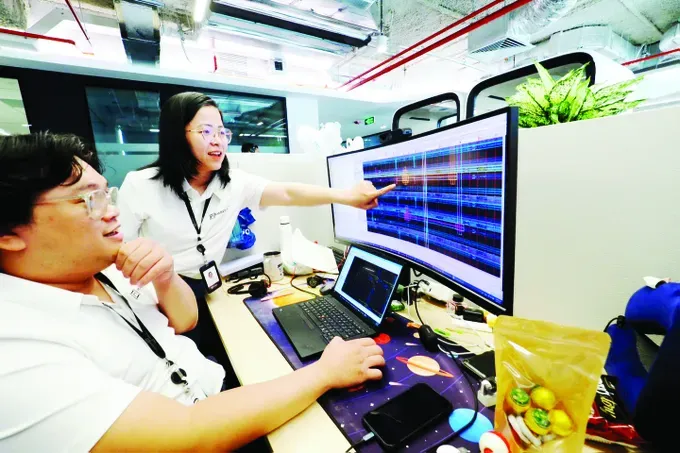
This year’s main program is structured with clarity, directly addressing the core issues that will help Vietnam and Ho Chi Minh City shape a new development model. Specifically, the plenary session on the morning of November 26 will provide a comprehensive overview of global trends, the digital economy, the green economy, and smart economic models.
Following this, three parallel sessions on smart manufacturing, green logistics and ports, and smart governance will form the most “action-oriented” part of the forum.
Within these sessions, models and solutions are decomposed into individual components for immediate practical implementation in Vietnam. They include advanced global factory models following smart and sustainable trends; low-carbon supply chain infrastructure—a key factor in enhancing the competitiveness of Ho Chi Minh City and the southern economic region; and smart urban governance systems based on open data and artificial intelligence (AI).
In the afternoon, a dialogue session with leaders of ministries will focus on institutional and legal frameworks—the prerequisites for implementing green-digital transformation in practice. Immediately following this will be the joint statement between Ho Chi Minh City and the WEF on smart manufacturing and responsible industrial transformation.
Finally, the “60 Minutes with the Prime Minister” session will outline strategic directions regarding the role of science and technology in national development.
The sessions not only clarify the theme “Green Transformation in the Digital Era” but also establish a comprehensive strategic framework, spanning mindset, policy, and implementation models, enabling Ho Chi Minh City and Vietnam to confidently enter the 2026–2030 development phase with a new foundation of a greener, more digital, and smarter economy.
In particular, the Joint Statement between Ho Chi Minh City and the WEF represents a significant milestone, affirming the city’s and Vietnam’s position as a “co-creator” in global initiatives led by the WEF, reflecting their new standing within the international cooperation network. Moreover, through this milestone, Ho Chi Minh City is entering the global manufacturing innovation network in a proactive role, contributing to the shaping of advanced industrial models that support the country’s green and sustainable development in this new phase.
A highlight of this year’s forum is the participation of 500 leading domestic and international enterprises in the “CEO500 – TEA CONNECT” program on the afternoon of November 25, ahead of the forum’s official opening session. This represents one of the largest public-private dialogue platforms ever held in Vietnam, bringing together the government, Ho Chi Minh City authorities, and the business community to discuss new drivers of economic growth.
The presence of leading global technology, finance, manufacturing, and logistics corporations in Vietnam creates significant collaboration opportunities not only for Ho Chi Minh City enterprises but also for the wider domestic business community. It also provides Vietnamese businesses with a chance to deepen their engagement in the global innovation ecosystem, expanding partnerships with technology collaborators, strategic partners, and long-term investors.
More importantly, the city expects businesses not only to play the role of beneficiaries but also to act as co-creators in programs related to smart manufacturing, low-carbon logistics, smart cities, financial centers, renewable energy, and the circular economy.
Businesses are the force that will transform the models, technologies, and initiatives discussed at the forum into practical outcomes, helping Ho Chi Minh City become a leading green and smart economic hub in the region and accelerating Vietnam’s journey toward green and digital development in the coming decade.
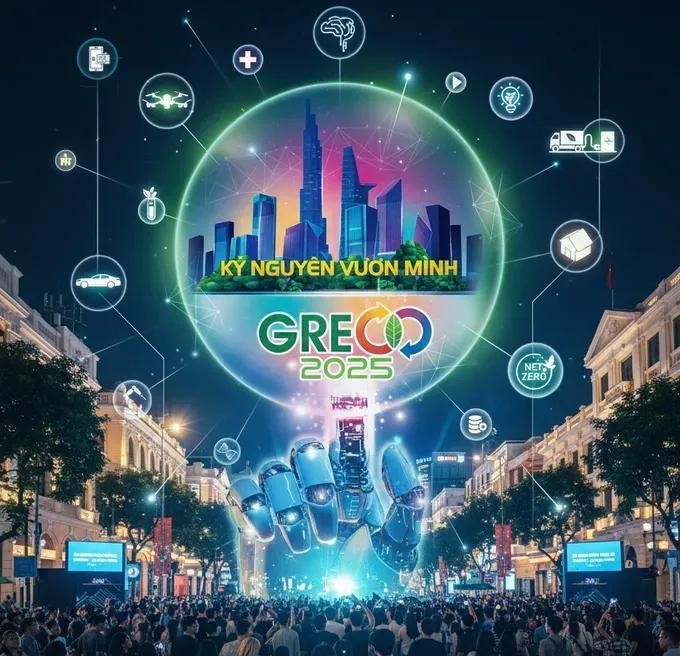
The city expects to set a new standard for Vietnam's policy dialogue events where there is not only discussion but also action; not only are problems raised, but solutions are proposed; and not only are visions presented, but specific post-forum programs are launched. Ho Chi Minh City aims to affirm its position as a hub for knowledge, technology, and innovation in the region, as well as a destination for global corporations and organizations in the journey toward green and digital transformation.
Vice Chairman of the Ho Chi Minh City People’s Committee Nguyen Loc Ha hoped that the WEF will continue to accompany Ho Chi Minh City as a long-term strategic partner—not only providing expert support but also co-creating with the city global models, standards, and initiatives, particularly in the fields of smart manufacturing, global supply chains, smart cities, and high-quality human resource development.
From another perspective, the city expects the forum to deliver tangible benefits to its residents. By focusing on core values such as digital government initiatives, open data, and smart governance, public services will become faster, more transparent, and more convenient. Transportation and production costs are expected to decrease, contributing to price stability as the city upgrades its logistics, energy, and digital infrastructure toward smarter and greener systems.
More importantly, residents will gain access to the latest technologies, inspiring the younger generation and fostering a community spirit of innovation.
He believed that the initiatives agreed upon at this year’s forum will serve as a crucial foundation for the city’s and the nation’s development journey in the 2026–2030 period.


